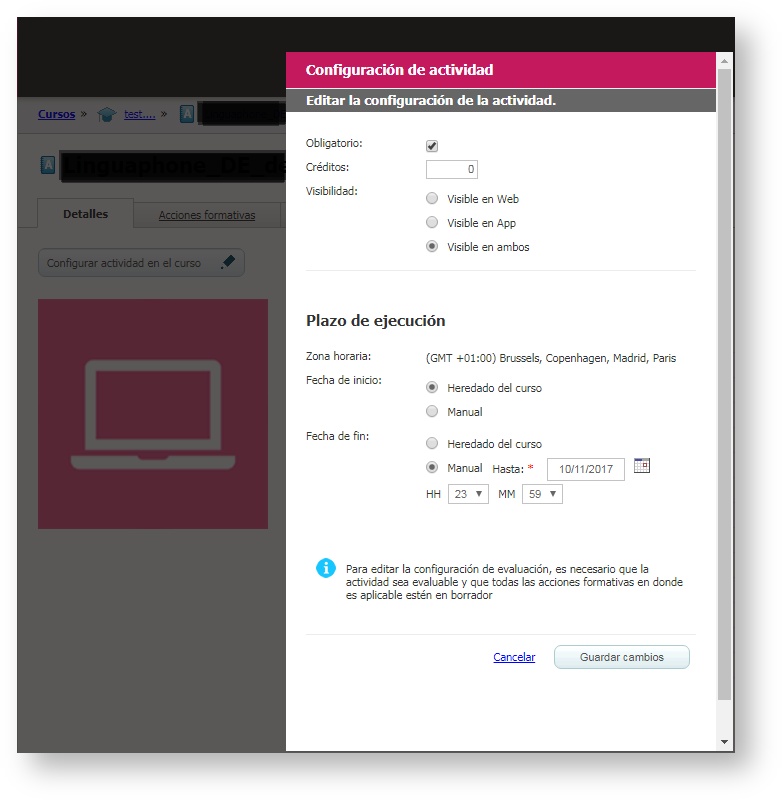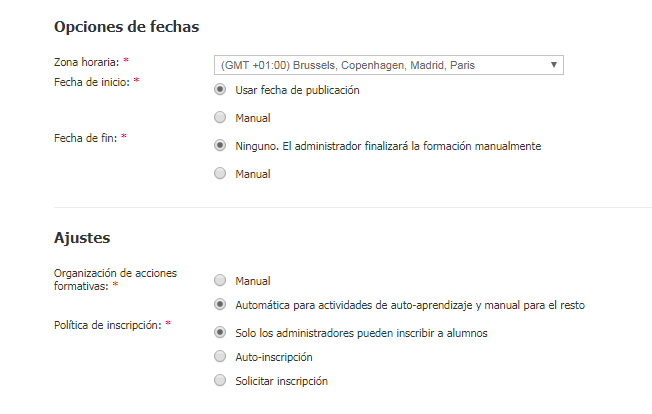FAQ: Use of Activities, Training Sessions, Courses, Plans and Collections.
ACTIVITIES
In LMS Pack, The activities are the smallest training units.
Based on the activities that are created, the courses will be constructed and the training tasks that the students have to overcome will be formed automatically.
The dates of the activities can be configured to start on the course start date or manually.Activity session Help
An activity session is the basis of a content, whether SCORM, TinCan or face-to-face. These activities are unique but we can combine them between courses, plans and training actions as we need them.Session ACTION
The Session actions would be the calls to carry out an activity within a course.
If, when creating a course, the organization of training actions is configured as “manual” ( See image below) , the date of the call for the training actions can be modified later and more training actions can be added.
If configured as "Automatic for self-learning activities and manual for the rest", the training Session will import the dates of the activitiesHelp for Session Actions
Each action session would be, if we compare it to a typical field of study, as an evaluation; It marks a period of time that the students have had to dedicate to it, so it provides us with basic information so that we can easily manage the way in which we want our students to surpass their assigned activities.
COURSE
The courses are itineraries composed of a series of activities for the student to acquire the required knowledge.
These courses may be part of a larger planning arranged in plans. For example, we could say that point of sale commercials are the potential recipients of a plan that is comprised of Commercial Skills courses and Commercial Products and tools at the point of sale.
During the creation of a course you have to fill in a series of mandatory fields.
Name: Assign a name to the course you are creating.Date options
When creating the course you must indicate the period during which that course will be active.
Adjustments
Organization of training actions
If when creating a course the organization of training actions is configured as "Manual" you will have to call one by one the training actions for each activity, you can subsequently modify the date of call for training actions and also you can add more training actions .
If you select "Automatic for self-learning activities ..." you will only have to manually summon the formative actions for the activities with the trainer (those of the Presential type, Videoconference or Exercise). The self-learning activities (SCORM / AICC / Tin Can, Link, File or Video) will be automatically convened when the course is published, taking as a reference the parameters of the course (students to whom it is intended, dates of completion and registration form) ).
Registration policy
The registration policy explains the way in which students can access a course.
1. You can choose "Only administrators can enroll students". If you enroll a student in a course, you will receive a notification.
2. Another option is that the course is "Self-registration", that is, the student has the possibility to see the course in their training catalog and can enroll in it automatically. In this case, you will only be automatically enrolled in the self-learning activities of the course.
3. If you select the option "Request registration", the student will see the course in its catalog and may request registration. In this process the tutor of the course will receive a notification with the application for registration. Subsequently, the student will receive another indicating if the request is approved or rejected. In addition, you will receive a notification if the registration policy is modified and your request will be revoked. In addition, you will have to indicate the period during which the registration can be requested (in the deadline you can indicate "Inherited from the course", that is, that coincides with the end date of the course. In any case, if you modify the policy of registration after the course is created, the tutor or tutors of the course receive a notification.
Rating policy
The valuation policy allows students to assess the courseThe courses can be formed by one or more activities (minimum one compulsory) and their start and end date declare the training action by default, but likewise, you can declare several training actions within a course (as if we had only one classroom) of music and several groups of students will need to go through that same classroom but avoiding being all at the same time), within each course of students the training unit would appear and disappear for as long as they enjoy the classroom, this time being evaluable. Likewise, if we assign a final date of course, it will be imported into the activities and the training actions that are within that course, so we must be careful not to assign past dates so that the training actions are not closed.Course Help
All the courses could have one or more activities (at least one, must be mandatory) and starting/ending dates creates a default activity session, but at the same time, you can have some activity sessions inside a course, also, if we provide an ending date to a course will be inherited by all the activity sessions inside, we must to be careful assigning these dates because if they are in the past will close all activity sessiones inside the course.
PLAN
A plan groups together a set of courses that are related to each other, either thematic or recipients. The objective of a plan is to create a training itinerary for a group of students.
Plans Help
Like the courses, the plans receive the start date and end date and these parameters can also be imported into the courses, training actions and activities. Remember that if you add courses to a plan their training sessions are not added, therefore, if users had previously approved it, if you add these users to the plan they will have to pass it again.COLLECTIONS
A collection consists of a group of courses or plans to where it is possible to grant access permissions for students. The students themselves can request access to the course they are interested in and if the course belongs to a collection, by accepting their application they are allowed access to all the training within that collection.
Collections Help
A collection is the largest management unit. In these are stored study plans, courses, training actions and activities. Remember that if you add Plans to a collection their training sessions are added too, therefore, if users had approved it before, they will not have to go through it again.






